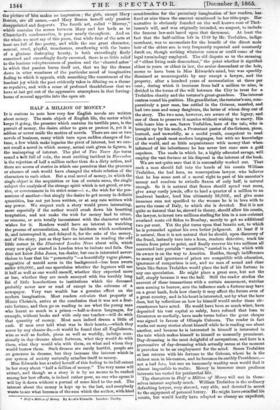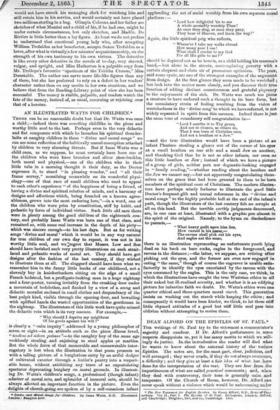HALF A MILLION OF MONEY.*
IT is curious to note how very few English novels are written about money. The main object of English life, the motor which keeps it going, the pressure which sustains its terrible pace, is the pursuit of money, the desire either to gain or protect it, yet it is seldom or never mide the motive of novels. There are one or two novels of business, many which turn upon sudden changes of for- tune, a few which make legacies the pivot of interest, but we can- not recall a novel in which money, actual cash given in figures, is the mainspring of interest. The plot of Two Years Ago turns round a belt full of coin, the most exciting incident in Ravenshoe is the rejection of half a million rather than do a dirty action, and there are scores of stories in which one perceives that the presence or absence of cash would have changed the whole relation of the characters to each other. But a real novel of money, in which the single object is. the acquisition or loss of certain sums, the single subject the analysis of the strange spirit which is not greed, or ava- rice, or covetousness in its strict sense—i. e., the wish for the pos- sessions of another—but simply the desire to get money in definite quantities, has not yet been written, or at any rate written with any power. We suspect such a story would prove interesting, more especially if the author would crush down his besetting temptation, and not make the wish for money lead to crime, -or remorse, or acts totally inconsistent with the character which wishes for it. Readers would have an interest in watching the process of accumulation, and the incidents which accelerated it, and interrupted it, and delayed it, for the sake of the money, .not of the story, just as they have an interest in reading the odd little corner in the Illustrated London News about wills, which every new pkper started in London tries to imitate and fails. One does not kdow John Jones, tea-dealer, but one is interested never- theless to hear that his "personalty "—a beautifully vague phrase, suggestive of untold acres in the background—has been sworn under 400,000/., and one speculates whether the legatees will use it half as well as one would oneself, whether they expected more or less, whether they are much annoyed with the terribly long list of little benefactions to institutions which the deceased probably never saw or read of except in the columns of a newspaper. Very vast wealth has a genuine effect on the modern imagination. Most readers calculate that property of Monte Christo's, arrive at the conclusion that it was not a first- rate fortune, and then go on reading to see what the young man who learnt so much in a prison —half-a-dozen languages, for example, without books and with only one teacher—will do with that quantity of money. Most men indeed dream a little of cash. If men ever told what was in their hearts,—which they never by any chance do,—it would be found that all Englishmen, wise as well as foolish, pious as well as worldly, indulge occa- sionally in day-dreams about fortunes, what they would do with them, what they would win with them, on what and whom they would bestow them. Such dreams are rarely hurtful, people are so generous in dreams, but they increase the interest which in our system of society naturally attaches itself to money.
Miss Edwards has availed herself of this feeling to its full extent In her story about "half a Million of money." The very name will attract, and though as a story it is by no means to be ranked among her best efforts, is indeed rather poor, no one who opens it will lay it down without a perusal of some kind to the end. The interest about the money is kept up to the last, and everybody wants to see what becomes of the sum which the author, with kind
• Ilot, a Mill,,, of Money. My Amella Edwards. London : Tinsley.
consideration for the pecuniary imagination of her readers, has fixed at nine times the amount mentioned in her title-page. Her narrative is obviously founded on the well known case of Thel- lusson's will, and was originally intended, we suspect, to include the famous law-suit based upon that document. At least the fact that the half-million left in 1769 by Mr. Trefalden, indigo merchant, was to accumulate for the benefit of the direct male heir of the eldest son is very frequently repeated and constantly dwelt on, though nothing whatever comes or could come of the legal terminology employed. The old dispute as to the meaning of" eldest living male descendant," the point whether it signified eldest in years or eldest in law, the senior descendant or the heir, seems to have been in Miss Edwards's mind, but was speedily dismissed as unmanageable by any except a lawyer, and the property, after a hundred years of accumulation at three per cent., during which it increases from half a million to nine, is divided in the terms of the will between the City in trust for a Trefalden charity and the testator's great-grandson. The interest centres round his position. His grandfather, the testator's son, com- parativelr a poor man, has settled in the Grisons, married, and had two sons and-many daughters, the latter of whom drop out of the story. The two sons, however, are aware of the legacy, and one of them to preserve it marries without wishing to marry. His wife bears him a son, Saxon Trefalden, hero of the tale, who is brought up by his uncle, a Protestant pastor of the Grisons, pious, learned, and unworldly, as a model youth, competent to read Greek and speak most modern languages, but with no knowledge of the world, and so little acquaintance with money that when informed of his inheritance he has never but once seen a gold napoleon. The mode in which he, a highly educated savage, will employ the vast fortune at his disposal is the interest of the book.
We are not quite sure that it is successfully worked out. That such a man should fall into the hands of his cousin William Trefalden, the bad hero, an unscrupulous lawyer, who believes that he has some sort of a moral right to part of his ancestor's money and resolves to swindle Saxon of only half, is natural enough. So it is natural that Saxon should spend vast sums, give away costly jewels, offer to lend a quarter of a million to an insolvent banker, lend him ultimately 59,000/., and give some immense sum not specified to the woman he is in love with to serve the cause of Italy, to which she is devoted. But it is not quite so natural that he, shrewd in theory, should allow his cousin, the lawyer, to invest two millions sterling for him in a non-existent overland route rid Sidon to Bombay, merely to get an additional two per cent. Yet the plot turns upon that lunatic act, to which he is persuaded against his own better judgment. At least if it is natural, then it is not natural that he should, upon discovery of the fraud, instantly turn into a keen, resolute detective, track his cousin from point to point, and finally recover his two millions all converted into portable "securities," carried in a bag, which with its owner is on the way to America. Besides, though indifference to money and ignorance of _prices are compatible with education, ignorance of comparison is not, and no man of sound and clear brain like Saxon Trefalden would place the half of his fortune in any one speculation. He might place a great sum, but not the half, simply because it was the half. Still the reader studies the account of these transactions with a certain amusement, watches men coming to borrow, sees the influence such a fortune may have on a great bank, feels how closely it may affect the future even of a great country, and in his heart is interested, not by what the hero does, but by reflections on how he himself would under those cir- cumstances have acted. He would have been so much wiser, have deposited his vast capital so safely, have refused that loan to Greatorex so cordially, have made terms before the great cheque was signed in favour of Olimpia Colonna. The reader in fact works out many stories about himself while he is reading one about another, and because he is interested in himself is interested in the tale which makes himself to himself so unusually prominent. Day-dreaming is the most delightful of occupations, and here is a provocative of day-dreaming which actually seems at the moment it provokes to be an-employment for the mind. Saxon Trefalden at last returns with his fortune to the Grisons, where he is the richest man in his canton, and he becomes its earthly Providence,— not a bad fate, but one an immensely wealthy man would find it almost impossible to realize. Money in immense sums produces interests too varied for patriarchal life.
The characters in Half a Million of Money will not in them- selves interest anybody much. William Trefalden is the ordinary defaulting lawyer, very shrewd, very able, and devoted in secret to the enjoyment of personal luxury. He might have swindled his cousin, but wou'd hardly have adopted so clumsy an expedient, would not have struck his managing clerk for watching him and still retain him in his service, and would certainly not have placed two millions sterling in a bag. Olimpia Colonna and her father are sketches of what Maemini and a child of his, if he had one, might be under certain circumstances, but only sketches, and Madlle. De Riviere is little better than a lay figure. At least we do not profess to understand that emotional young lady who, after accepting William Trefalden as her benefactor, accepts Saxon Trefalden as a lover, after what is virtualljA few minutes' acquaintanceship, on the strength of his own testimony to his own virtues. The detective is like every other detective in the novels of to-day, very shrewd, vulgar, and upright, and Miss Hatherton is a palpable copy from Mr. 'rrollope's favourite "specimen of the Tabitha Crossus," Mies Dunstable. The author can carve more life-like figures than any of these, but she has preferred to rely on a defect in her readers' character rather than on any merits in her own creations, and we believe that from the Reading-Library point of view she has been successful The money is visible, palpable, and readers watch the fate of the money, instead of, as usual, mourning or rejoicing over that of a heroine.



































 Previous page
Previous page